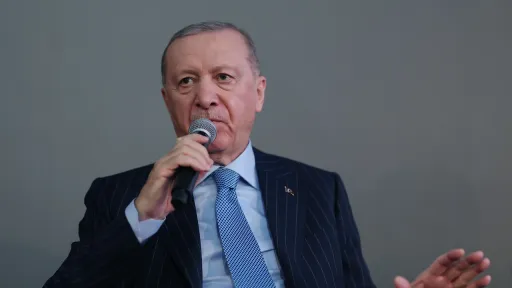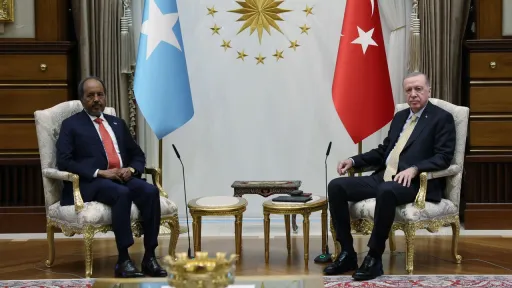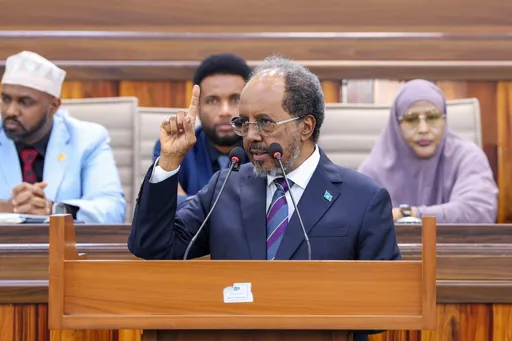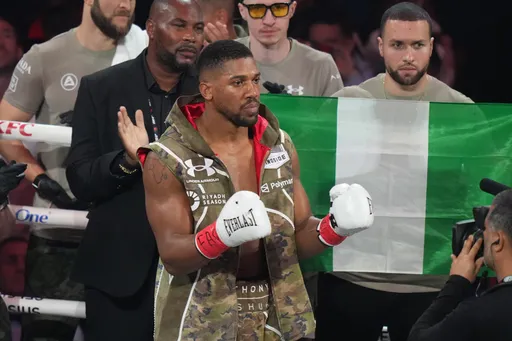By Coletta Wanjohi
George Ekombe tells his last customer to hurry up because he needs to close up his shop at Kibagare village, an informal settlement in Nairobi, and go for football practice.
The 24-year-old runs a small one-room shop where people can play video games on a small screen that he has mounted on the wall. He can only afford one screen, and customers take turns to play.
On a good day, he earns about $2 in Kenyan Shillings. “This is my life now,” George tells TRT Afrika. “It is very tough because sometimes I hardly even make that money, but I will stick to this because I am not going back to crime,” he adds.
George’s story is also the story of thousands of other young Kenyans seeking redemption after being drawn into the dangerous world of crime – mainly to escape crippling poverty but sometimes also in a rush of adrenaline.
The latest economic survey by the Kenya National Bureau of Statistics shows the number of crimes recorded in 2021 at 81,200, a sharp increase from the previous year.
Law enforcers say most of these crimes were committed by young people, mainly male teenagers.
Some of those that TRT Afrika spoke to in Kibagare village said growing up in informal settlements like theirs offers young people limited opportunities.
School dropouts and unemployed, these young people are drawn to crime as a shortcut to a life of material comforts. Instead, most of them ended up dead or behind bars.
George ran away from home at the age of seven when he felt he ''had become a man”.
“After being in the streets for two years, I learnt the skills of mugging and stealing people’s phones and bags. As a teenager, getting between $30 and $100 in a single day was heaven for me,” he explains.
All the money made he spent on alcohol and “other pleasures”.
“My worst nightmare in crime came one day when one of my two pals told us he had organised a grand crime that would take us out of poverty forever… we thought it was either stealing a television or a radio,” he recalls.
His life changed that day when “we attacked a man whom he said was his former boss”. George says he started having second thoughts about the streetlife when they realised his colleague had acquired a gun.
“This wasn’t our style, we only snatched phones and mugged people, but we had never indulged in weapons. I got very scared because having a gun is not a good thing. In the streets, we believe a gun will lead you to your death.”
In 2017, two of his street allies were gunned down by police while robbing in broad daylight. He knew that would be his path if he did not change.
“I moved to Kibarage village…but living idly in such an informal settlement made it hard for me to stop thinking of crime,” he says.
It was then that Aaron Kifogo – the coach of a football team – offered George a chance at a new life.
“Coach Aaron approached me and asked me to join his football team. Aaron is just 30 years old, but to me, he is like the father I never had. He supported me in setting up this business too.”
A village youth leader, Aaron constantly interacts with all the young people to motivate them and keep them away from the streets.
Rabbit out of the hat
As George locks up his shop, he calls out to Setrick Isichi, 26, a teammate who works in the next shop.
Setrick’s only source of income is from carrying water bottles from the shop to the customers’ homes, and on a good day, he earns up to a dollar.
His life followed a similar trajectory to that of George.
“I entered the crime world at 15. I was a street boy, I admired the money people got when they stole,” Setrick tells TRT Afrika.
His first attempt was snatching a phone from a person in a moving car. That set the pace for seven more years of petty theft.
His facial muscles tighten up, and he leans forward before continuing in a lower voice.
“One day in 2012, one of my three friends snatched a phone and got away, so I also made an attempt to do the same,” he explains, his eyes tearing up. “But as I attempted to run away, I was caught by two men, who started shouting that I was a thief, and a mob gathered around me in seconds.”
The impact of mob justice is evident in the many scars on his face and head.
Police saved Setrick from the mob, took him to a hospital, and later sent him to prison.
Two years of life behind bars was tough, with nobody to even visit him. But it set the foundation for his reform. He went back to school while in prison.
He smiles as he recalls the time the prison warden gave him three rabbits to rear, and by the time he was set free, they had multiplied to 50.
After his release, Setrick returned home to Kibagare village, determined to steer clear of crime. He married and had twins. He depended on odd jobs and even joined the village’s football team.
However, his children died the same day, before even making a year.
“I regret robbing people and making them desperate. When my children died, I imagined fate was beating me up because of the evil I did to people,” he says, tears flowing down his cheeks.
The beautiful game
Though Kenyans have most excelled in long-distance running in the global sporting arena, football remains the most popular sport in Kenya for children and adults alike.
Children who cannot afford to buy a ball improvise by wrapping discarded plastic bags in the shape of a ball. For grown-ups, it is a professional and recreational sport.
The dusty Kibagare Bamboo Stadium gets very busy from 4 pm every day. Residents from the informal settlement trickle into exercise, some in groups while others individually. Children join in.
For some residents, it is a place to meet and chat as they watch the activities.
When Aaron Kifogo blows the whistle, members of ‘Kibagare Sportiff’ – the team George and Setrick play for – know it’s time for action.
His players call him Fiesco, a nickname he coined for himself. Some hug him, and others pat him on his shoulders as they form a ring and await his instructions.
“I am driven by passion and pain,” explains the 29-year-old, father of one and a guardian to a sister and brother.
“Being born and brought up in this informal settlement, I have seen that crime is a destroyer. So many of my friends have been gunned down or died from mob justice. I was arrested for fraud too, when I was younger. After my release, I realised I had to change because my sister and brother depend on me.”
'Sports saved me from bullets'
In 2018, Aaron started a programme called ‘Youth Campaign Against Crime’ to reach out to young people like him who believed crime was the only source of income.
The challenge, he says, was he had no response when young men asked him what he would offer them as an alternative to crime.
“I would spot a young man who is still a criminal and encourage him to join us. I would encourage them that football will help us stay away from drugs, jail and death from crime. There is comfort in being part of the team because nobody will judge you here, as 90 percent of us have been criminals.”
The team began with 15 people and has, over time, grown to 40.
George trains with the team, but during tournaments, he becomes their commentator,
“Sports has saved me from bullets and prison. Football eliminates ideas of thuggery and rape…,” George explains. “When I come here and train, I leave when I am tired. I go home and sleep. I don’t have the time and energy to go to the streets to steal. That is the power of football.”
For some, like Isichi, the game has made him feel valued. “Sports has connected me to many friends. It has enabled me to travel around the country for tournaments. There are places I have gone to, and strangers cheered me and congratulated me for playing well. People being happy for me is something I never experienced when I was a criminal,” he says.
Aaron depends on the generosity of his friends to support the team. His members call him the ‘one call away coach’ because he always makes calls to borrow other teams’ uniforms and shoes whenever they have a tournament.
About four years ago, when the ‘Kibagare Sportiff’ football team was launched, the village lost at least five boys per year, all killed because of criminal activities.
Aaron says this has reduced to about two per year because more young people are joining his team and seeing a reason to engage in sports.
He says some parents are sending their teenage boys to join the club.
Football clubs have also cropped up in some other formal settlements to steer social change among young people.
Some engage in other sports like volleyball and chess.
Aaron’s team has also become a welfare group. Each member contributes half a dollar every month, which goes to a kitty and is used to support a member during an emergency.
He looks forward to the day when Kibarage will not have to lose even one person to crime.
For George and Isichi, the game has opened a new door for a new life – another chance to live life right.
























